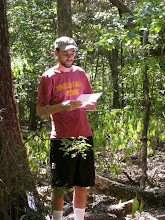I found this essay the other day, and some of the things I wrote are coming back to me, almost cyclically, in the way I'm trying to live my life. It's called Life As Seen Through the Eyes of Poetry. Very lame, but I'm always terrible with titles. Enjoy! Much love :)
A poem can come from any thing, any place and any person; maybe that's what I love so much about poetry. A verse can be confined to an aesthetic scene in nature as much as consciousness can be confined to a series of black and white snapshots indicating one's identity. Poetry is ingrained into our senses. It doesn't matter if you know how to put it on paper or understand the difference between a cinquain and a haiku. We all see, hear, smell, taste and touch poems every day. In fact, our consciousness itself sometimes seems to be one mesmerizing, intricate series of poetry.
Think about the way you look at a loved one, whether this person is a sibling, parent, lover or friend (or even a random person you happen to pass on the street, if you see such a person as a loved one). Does something about this person strike a chord within you each time you cross his or her path? Although I am presenting only one example, it is an example of poetry. Love, happiness, anger, art, peace, hatred, sex, money, hunger, drugs, religion, politics, sports, pain, music, freedom, oppression, history, earth, the unknown: ALL of it is poetry being written in one form or another. We walk, talk and breathe through intertwined landscapes of it every moment.
There are no rules concerning the autonomy of one's consciousness. That being said, my developing understanding of the boundless horizons of poetry (which could simply be referred to as art, as well) continues to lead me back to recurring ideas about the nature and evolution of humanity. These repeated notions can be explained by starting on a local and even personal level.
I love my family. There is simply no doubt about it. I almost selfishly want them all to defy the cycle of life and live to see progress and the changes that will eventually be made to make the world a more healthy and peaceful one. I have recently come to understand what this love means to me, as well as to the rest of my family. It means kindness, support, happiness, compassion, intellectual stimulation, etc. My family is the primary source of all these wonderful things in my life.
Simply put, I want ALL people to sense (in the most broad interpretation of the word) the beautiful poetry of this symbiotic relationship. I want ALL people to experience the love and peace that I feel when I'm with my own family. Some people would like our relations with other people, groups, nations, etc. to be more complicated than this simple notion of complete compassion. I don't believe we have to make our inherently positive social relationships into complex webs leading to deceitful self-interest that detracts from our true connections with one another.
Conversely, I have experienced limited amounts of hate. I have used hateful words toward people whom I believed to be wrong, and I have experienced the same from others. What I am beginning to realize is how much such hatred hurts on a personal level and breeds separation on a communal level. I want nobody to experience hate. I would much rather see and hear about all people feeling love and acceptance instead of hate and intolerance. I want people to feel the power of this type of poetry for the stinging indictment it brings upon such negative parts of humanity that we must overcome.
I, like any other person, struggle with emotions. But one thing I do understand about emotions is how powerful and meaningful they are to me. Consequently, I also understand that EACH individual's emotions add powerful and substantial meaning to that person's life. I have no desire to ever diminish a person's feeling of emotional, physical, psychological or spiritual self-worth. We do this so often as a species by claiming superiority and professing absolute righteousness (among other things).
I feel like many of my notes are redundant. I have exhausted my repertoire of unpolished writing skills, trying desperately to connect on some level with even one person who happens to stumble upon my unofficial collection of work. Simply put, compassion and open-mindedness are the two keys to a revolution of the mind, heart and soul. If we could remove our unquenchable desire for something better and just BE those two things, then human beings are still capable of some pretty amazing accomplishments in the future.
“Let us enjoy breathing together.”
~ Thich Nhat Hanh
